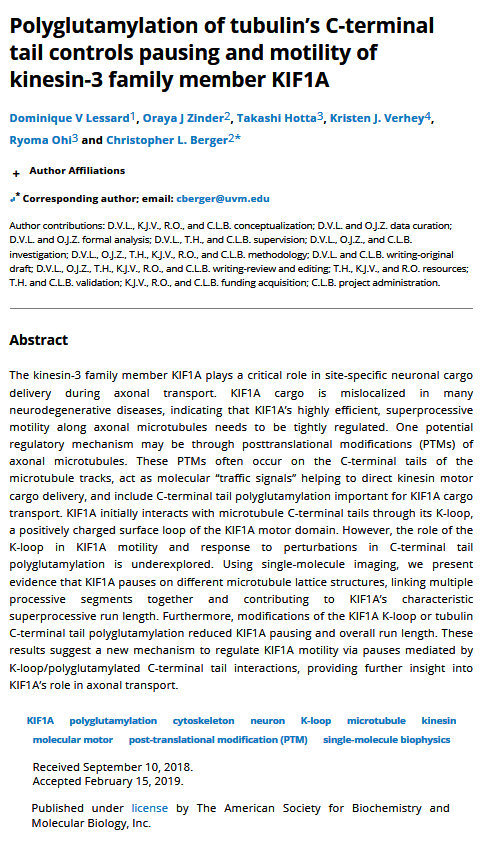13.11.2019
Polyglutamylation of tubulin's C-terminal tail controls pausing and motility of kinesin-3 family member KIF1A
Journal of Biological Chemistry, 2019
Recently, Lessard et al. investigated how polyglutamylation of tubulin’s C-terminal tails (CTTs) regulates processivity of the neuron-specific kinesin motor KIF1A. KIF1A transports neuronal cargo anterogradely along axonal microtubules (MTs) over long distances (~3 microns). Prior studies implicated interactions between the K-loop of KIF1A and polyglutamylated CTTs in the regulation of KIF1A motility. The K-loop is a lysine-rich surface loop that attaches the motor to MTs via interactions with glutamate-enriched tubulin CTTs. Single-molecule total internal reflection fluorescence microscopy was utilized to better understand how polyglutamylation regulates KIF1A motility. Dimeric KIF1A exhibited novel, stochastic pausing behavior during motility on paclitaxel-stabilized MTs. Such pauses enabled KIF1A to combine multiple sequential runs into a super-processive run length. Furthermore, the K-loop/CTT interaction positively regulated KIF1A’s landing rates onto MTs and pause frequency and duration. Moreover, CTT polyglutamylation regulated this interaction and KIF1A’s subsequent motile behavior. Cytoskeleton’s 99% pure rhodamine-labeled porcine brain tubulin (Cat.# TL590M) was essential as the motor substrate for TIRF microscopic analyses of how K-loop/CTT interactions regulate KIF1A’s processivity. These results provide novel mechanistic insights into KIF1A-mediated axonal transport and the regulatory role of tubulin CTT polyglutamylation, which may further clarify how dysfunctional MT-based, kinesin-mediated axonal transport contributes to neurodegeneration.
Abstract
The kinesin-3 family member KIF1A plays a critical role in site-specific neuronal cargo delivery during axonal transport. KIF1A cargo is mislocalized in many neurodegenerative diseases, indicating that KIF1A's highly efficient, superprocessive motility along axonal microtubules needs to be tightly regulated. One potential regulatory mechanism may be through posttranslational modifications (PTMs) of axonal microtubules. These PTMs often occur on the C-terminal tails of the microtubule tracks, act as molecular “traffic signals” helping to direct kinesin motor cargo delivery, and include C-terminal tail polyglutamylation important for KIF1A cargo transport. KIF1A initially interacts with microtubule C-terminal tails through its K-loop, a positively charged surface loop of the KIF1A motor domain. However, the role of the K-loop in KIF1A motility and response to perturbations in C-terminal tail polyglutamylation is underexplored. Using single-molecule imaging, we present evidence that KIF1A pauses on different microtubule lattice structures, linking multiple processive segments together and contributing to KIF1A's characteristic superprocessive run length. Furthermore, modifications of the KIF1A K-loop or tubulin C-terminal tail polyglutamylation reduced KIF1A pausing and overall run length. These results suggest a new mechanism to regulate KIF1A motility via pauses mediated by K-loop/polyglutamylated C-terminal tail interactions, providing further insight into KIF1A's role in axonal transport.
Products used in this citation:
Tubulin protein (rhodamine): porcine brain (Cat. # TL590M-A)
Tubulin protein (rhodamine): porcine brain (Cat. # TL590M-B)


